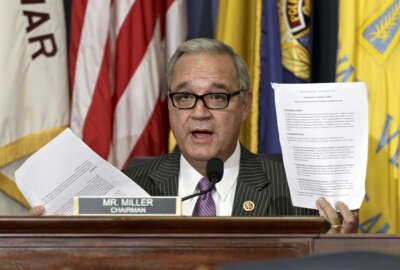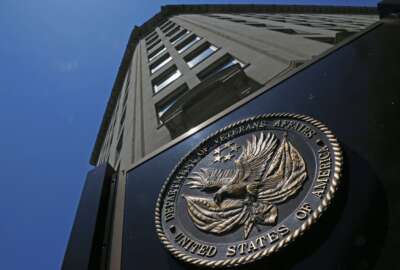
Lawmakers punt major VA issues to next Congress
A new omnibus veterans package cleared the House Tuesday afternoon, but it doesn't address three controversial issues that both veterans affairs committees and the...
In the final few days of the 114th Congress, the House easily passed a series of bills Tuesday afternoon that make small changes to veterans health care and benefits.
Yet the package doesn’t address several controversial issues that Veterans Affairs Secretary Bob McDonald and veterans committees in both chambers of Congress have spent the past year debating: a solution to the veterans appeals process, new accountability procedures for VA employees or an extension or alternative to the Veterans Choice Program. Those challenges will get punted to the 115th Congress.
The Jeff Miller and Richard Blumenthal Veterans Health Care and Benefits Improvement Act is named after retiring House VA Committee Chairman Jeff Miller (R-Fla.) and outgoing Senate VA Committee Ranking Member Richard Blumenthal (D-Conn.).
“These bipartisan bills are designed to help improve health care, benefits and services for those who are most deserving — our nation’s veterans,” Miller said in a statement. “I’m especially proud of the provision in H.R. 6416 that brings transparency and accountability to VA’s often abused administrative leave system.”
Blumenthal urged his colleagues in the Senate to quickly pass the bills.
“More veterans, including many at risk of homelessness, will receive the care and benefits they need and deserve,” he said in a joint statement with Senate VA Committee Chairman Johnny Isakson (R-Ga.). “VA hospitals will have better management of mental health counselors and emergency room doctors. Veterans’ families will be helped by extended critical education benefits to surviving members.”
Carlos Fuentes, legislative director for Veterans of Foreign Wars, said both committees negotiated a bill they believed could reasonably pass the Senate.
The bill has more than 70 different provisions, most of which have already been proposed by lawmakers earlier this year.
One provision limits the time VA employees can spend on administrative leave in a given year to 14 days. That provision in particular had support from Miller, whose VA Accountability First and Appeals Modernization bill passed the House earlier this fall but won’t likely get a vote in the Senate.
In addition, it streamlines portions of disability compensation and benefits process for veterans.
The legislation also increases the number of judges who can make appeals decisions for veterans from seven to nine, a temporary fix for an archaic and lengthy appeals process.
The provision is certainly a disappointment for the VFW, who had worked with the department in 2016 to revamp the appeals process — and for Rep. Dina Titus (D-Nev.), who introduced a stand-alone measure to address the topic.
“The Republican leadership refuses to bring the bill I sponsored on appeals reform to the floor without tying it to an accountability bill that strips VA employees of necessary civil rights protections,” she said from the House floor Tuesday. “We’re told that passing an appeals reform without accountability just won’t work. Well, using that speech as argument, we shouldn’t pass any VA reform bill without accountability because it just won’t work.”
The legislation also lets the VA Secretary set more flexible schedules for the department’s physicians. Specifically, the bill gets rid of the 80-hour biweekly pay period, as long as doctors work at least 2,080 hours in a given calendar. It’s a provision that Secretary McDonald has actively advocated for this year as one of his main priorities.
The bill contains bits and pieces from the Veterans First Act, the omnibus package that Isakson has spent the past seven months touting. The committee unanimously approved it but the legislation never made it to the Senate floor.
Most notably, this veterans package lacks a comprehensive alternative to the current Choice program, which will expire this summer without congressional action. The VA has long argued it needs the authority to consolidate the seven different ways veterans can currently access health care.
Delaying that decision puts it in the hands of the new administration and VA Secretary.
The House also passed a separate bill that sets up a pilot self-scheduling patient appointment system in at least three Veterans Integrated Services Networks.
The Faster Care for Veterans Act, which Rep. Sean Moulton (D-Mass.) introduced, demonstrates the frustration Congress has with VA’s ongoing efforts to develop a better scheduling solution.
“VA’s IT development record is mixed, to put it mildly, and past experience [shows] that meeting high standards and firm deadlines are crucial to success,” said Rep. Phil Roe (R-Tenn.) who takes over the House committee’s chairmanship in January. “The time has come to settle this issue once and for all.”
Specifically, it asks the VA Secretary to issue a request for proposal for an off-the-shelf scheduling option.
The pilot would last for 18 months, and the VA Secretary must report to Congress what improvements he sees with the contractor solution. An independent expert would then verify whether the off-shelf solution and the VA’s system meet congressional standards.
VA is expected to roll out its own self-scheduling mobile app in January 2017. The bill essentially puts the VA system in direct competition with an off-the-shelf solution.
“The concept is, in other words, a bake-off to create the most successful possible software for our veterans,” Roe said. “Ideally, both systems will meet the standards. But if the government’s system cannot make the grade, VA will have a commercial alternative, thoroughly piloted and ready to go to work for our patients.”
Copyright © 2025 Federal News Network. All rights reserved. This website is not intended for users located within the European Economic Area.
Nicole Ogrysko is a reporter for Federal News Network focusing on the federal workforce and federal pay and benefits.
Follow @nogryskoWFED





